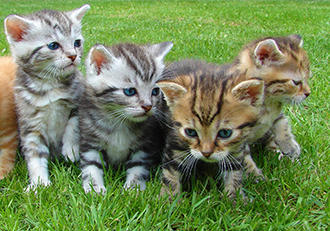The Science of Cats – Unravelling Feline Behaviour
The Science of Cats – Unravelling Feline Behaviour
Cats are the most favorite pets and owners adore them because of their mysterious nature. To understand the science of cats, owners have to pay attention to their cat’s body language and behavioural changes. In this blog, we will discuss some behavioural issues of cats that are proven by science.
Purring:
Purring is so common in cats and they mostly start purring after they cross two years. Cat not only purr when they are happy or relaxed but also purr when they are sad or furious. Scientists believe that purring works as a comfort tool. It is beneficial for cats as whenever they face some injury or pain, their brain triggers their larynx to vibrate at a frequency of 25 to 150 times a second, which makes a purring sound. Humans also take advantage of cat’s purring as it lowers their stress and blood pressure levels.
Landing on their feet:
From jumping from the wall to the ground, cupboards to the beds, one interesting fact about the cat is that your tiny feline will land from any height and stand on their feet. This is called the righting reflex; cats are lightweight animals whose bodies can handle flexible falls without harm.
The Science Behind Cat Scratching:
You find it quite irritating when your cats start scratching your sofa or any furniture randomly and you get curious about their behaviour. They scratch to clean their paws and sharpen them, scratching also removes dead skin from their nails. You can also provide your cat with a good scratcher.
Cats sometimes push their paws up and down, mostly on soft surfaces. It is called making bread or biscuits. It is a habit, which cats develop when they are kittens. Research also says that cats sometimes scratch to overcome their anxiety or stress.
So, whenever you find your cat scratching make sure that your feline friend is doing well.
Hygienic but not interested in bathing:
Cats are one of the most hygienic pets; they spend almost half of their day in self-grooming. They lick their furs more often to clean the dirt but when it comes to bathing, they get irritated. What is this confusion? Some of the reasons are given below:
- Water makes their fur wet and takes a long time to get dry, which makes them irritated.
- Cats have a strong sense of smell, there might be some smell of minerals or chlorine from the water which your cat does not like.
- Cats really do not like shampoos and soap as chemicals might cause itching in their eyes or body.
- There are some biological reasons that cats do not like water that much. However, some cat breeds like water _ such as American shorthair, Maine Coon, Turkish van and many more.
Cat’s Urinal Spraying:
Urine spraying is normal but not a good feline behaviour. Sometimes cats spray their urine when they feel fearful or uncomfortable therefore, instead of getting angry, try to comfort them. Whereas, if it is daily routine behavior then you need to take it seriously.
- Consult a vet to know about your cat’s medical condition.
- Litterbox cleanliness is a must.
- Felines require behavioural therapies.
- Sometimes environmental change could be helpful; relocation of cat is an option.
Cats Chattering and Chirping:
Owners see their cats chattering and chirping; some of the reasons behind this cat’s behavior are mentioned below:
- Mostly, chattering happens when the cat sees a bird outside and they try to communicate with them in their language.
- Sometimes you notice your cat’s chattering while looking outside a window. Theories suggest that the cat’s hunting desire might kick in when they see some insect or bird.
- Finally, the cat sometimes chatters in frustration. Marilyn Krieger a certified cat behaviour consultant says; “I have seen cats chatter over a laser pointer”.
Cats like small places:
Pets sleep almost 15 to 18 hours a day. Pet owners often notice that their cats like to spend their rest time in small spaces like a box or any corner of the house. They like packed places as it gives them a sense of security. Cats usually like warm places and if the room temperature is warmer around 14 Degrees, they will be comfortable resting in that room.
Bringing Dead Animals at Home:
Some cats bring dead animals, such as rats and mice to their owner. According to a cat behaviorist, when your cat hunts and kills an animal, they feel safe and comfortable about that area. Therefore, they like to bring their catch home and share the victory with their owner. However, this behavior could be prevented by the following techniques:
- Get your cat hunting toys and fulfil their hunting instinct.
- Stop letting out your cat alone in the early morning or night.
- If you have birdfeeders in your terrace or garden, place them away from your cat’s reach.
- Placing a bell in your cat’s collar can help; as the sound of the bell will alert the prey and stop your cat from killing it.
Sudden Sprinting:
Cat owners sometimes notice a sudden sprinting behavior in their cats. They are sitting calmly and all of a sudden, start running into the house. This action is called Zoomies, which can happen due to the following reasons:
- One of the main reasons is that cats usually sleep half of the day, therefore when they need their energy to come back, they start sprinting.
- There is a chance that your cat can start sprinting when they face some kind of pain or discomfort in their body. Your aging cat could start zoomies at home when it they experience a loss of eyesight or hearing.
- If you see that your cat starts zoomies after pooping, it might be an indication of constipation or some other health issues. In that case, you should immediately consult the vet.
Here we discussed the science of cats to better understand our feline behavior. However, every cat has different cognitive development and personality traits and therefore finding out about some of their unfamiliar behavioral patterns helps us to understand our pet better.









Leave a Reply